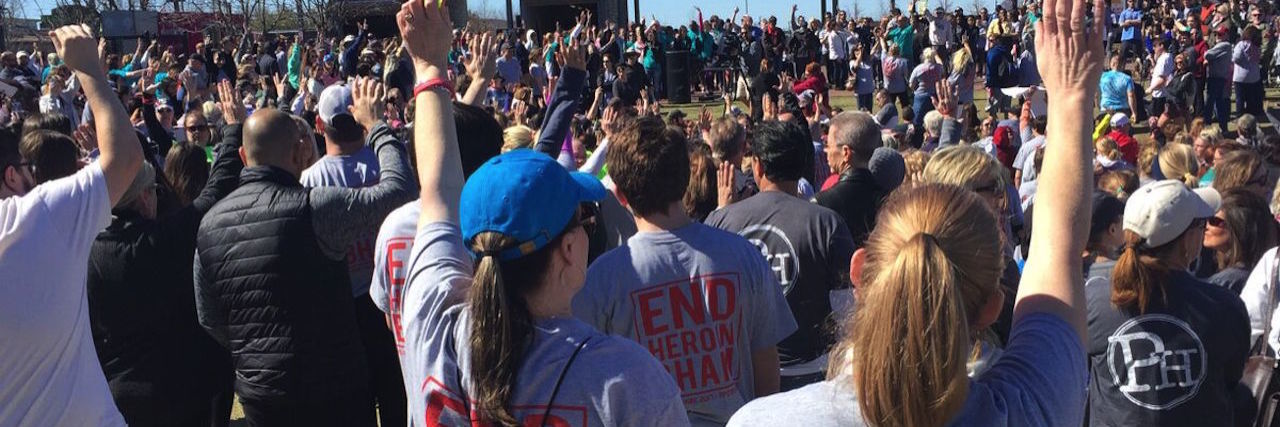We’d broken off from the thousands of people who were walking around Birmingham’s Railroad Park. My 10-year-old son was tired: we had spent the morning at the Walk To End Birmingham, after a late night at his first concert. I said we could leave, but I wanted to stop by the information tables.
It was the board with all of the names written on it that stopped me. The large panel — about five feet tall by three or four feet wide was covered in names. From the messages, some of them appeared to still be alive, but most were dead. Many, not all, were young.
And then came a woman, holding a piece of paper with a love one’s photo and date of birth and death. There wasn’t enough room on the board.
“I don’t want to cover up any of these other names. But there’s nowhere to put him.”
The event was one of the largest for the Addiction Prevention Coalition of Alabama — nearly 4,000 people gathered on this Saturday morning. This week, news was released that heroin-related deaths quadrupled between 2010 and 2015. It’s an epidemic, as witnessed by the thousands of people gathered in one park on one Saturday. They were not there for a casual jog.
They were there holding signs with photos of their loved ones, in some cases wearing homemade shirts and buttons with their photos. Brothers, sisters, mothers, fathers, sons and daughters.
And this woman, standing at this wall. The paper she held had the photo of her first husband, as well as his year of birth and his death and the words: “Finally Free.”
“He was clean for more than a decade,” she told me. “He opened halfway houses, helped other people. And then he went back out. One time.”
That’s how insidious addiction is.
Her name was Angela. I helped her tape the paper to the bottom edge of this board, making sure it was fastened as to not blow away in the cool breeze. “He was a good man.” I thanked her for telling me a bit about this man, her first husband.
“Do you have a story?” she asked.
“Yes, I do,” I replied.
Angela and I spent the next 20 minutes talking about our stories. Heroin, thank God, is not part of my story, but it could be mine, or anyone’s. That’s clear from the faces in the park and the signs they hold. Clearly this is not a “them” problem. It’s an us problem.
“If people don’t think that it’s everywhere, they are wrong,” Angela said. “It’s in the suburbs and at the universities. If they say ‘it can’t happen to my child,’ they are mistaken.”
I’ve really never seen a gathering like this here in my community — thousands of people standing together as a collective to say: We acknowledge addiction and recovery, the tremendous and horrifying toll it takes. We are fighting and we are going to keep fighting.
At one point, APC’s Danny Molloy, a person in recovery himself, asked for everyone who knows someone who has fought heroin, or died from it, to raise their hands. The response was staggering.
What does a walk do? During remarks, organizers acknowledged they’d heard that question. Their answer: it’s about what each one of us does every day. And I saw a sea of motivated people — nearly 4,000 to be exact, clearly projecting the message: this is not a fight in the darkness. This is a fight for the light.
I am passionate about recovering out loud. I can’t claim to have walked the same path as the person to the left or right of me, but I did and do feel a profound kinship with them. This is my tribe — the broken, the hopeful, the ones who have seen and experienced the hell of addiction first hand. We fight hard.
Sometimes all you can do is to show up. Raise your first at the sky. Channel your anger at this devil, lock arms with your neighbors. Figure out what you can do today and the next day and the next, remembering the bravery of a mother pinning a photo of her son with his date of birth and death to her t-shirt, with the words, “My precious son.”
So back to Angela. Our conversation was deep and heartfelt, and things were said that shall remain private. But she looked me in the eye and said, “You have a purpose. It’s your little boy.”
It’s all of our little boys.
It’s our fight. Count me in.
This article originally appeared on Medium.
We want to hear your story. Become a Mighty contributor here.
Image via contributor

